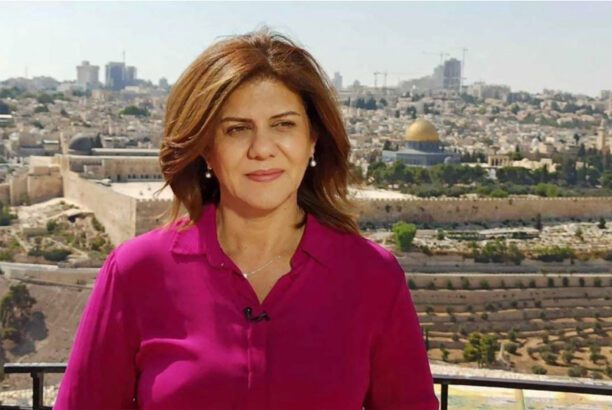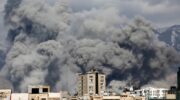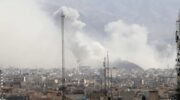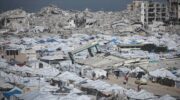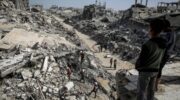The May 11, 2022, killing of Palestinian-American journalist Shireen Abu Akleh is part of a deadly, decades-long pattern. Over 22 years, the Committee to Protect Journalists (CPJ) has documented at least 20 journalist killings by members of the Israel Defense Forces.
Despite numerous IDF probes, no one has ever been charged or held responsible for these deaths. Failure to pursue justice for slain reporters undermines freedom of the press.
Deaths are just one part of the story. Many journalists have been injured, and in 2021 the military bombed Gaza buildings that housed offices of more than a dozen local and international media outlets, including The Associated Press…
reposted from the Committee to Protect Journalists, May 9, 2023
Tel Aviv, May 9—One year after Al-Jazeera Arabic correspondent Shireen Abu Akleh was fatally shot in the head while reporting on an Israeli military raid in the West Bank, a new report by the Committee to Protect Journalists exposes a pattern of lethal force by the Israel Defense Forces alongside inadequate responses that evade accountability.
Since 2001, CPJ has documented at least 20 journalist killings by the IDF. The vast majority—18—were Palestinian. No one has ever been charged or held accountable for these deaths.
“The killing of Shireen Abu Akleh and the failure of the army’s investigative process to hold anyone responsible is not a one-off event,” said Robert Mahoney, CPJ’s director of special projects and one of the report’s editors. “It is part of a pattern of response that seems designed to evade responsibility.
Not one member of the IDF has been held accountable in the deaths of 20 journalists from Israeli military fire over the last 22 years.”
CPJ’s report, “Deadly Pattern,” finds that probes into journalist killings at the hands of the IDF follow a routine sequence. Israeli officials discount evidence and witness claims, often appearing to clear soldiers for the killings while inquiries are still in progress.
The IDF’s procedure for examining military killings of civilians such as journalists is a black box, notes the report.
There is no policy document describing the process in detail and the results of any probe are confidential. When probes do take place, the Israeli military often takes months or years to investigate killings and families of the mostly Palestinian journalists have little recourse inside Israel to pursue justice.
The report also finds that Israeli forces repeatedly fail to respect press insignia, sending a chilling message to journalists and media workers throughout the West Bank and Gaza, the Palestinian areas under Israeli military control where all 20 killings occurred. Like Abu Akleh, the majority of the 20 journalists killed—at least 13—were clearly identified as members of the media or were inside vehicles with press insignia at the time of their deaths.
For example, in 2008, Reuters camera operator Fadel Shana was wearing blue body armor marked “PRESS” while standing next to a vehicle with the words “TV” and “PRESS” when a tank fired a dart-scattering shell that pierced his chest and legs in multiple places, killing him.
“The degree to which Israel claims to investigate journalist killings depends largely on external pressure,” said Sherif Mansour, CPJ’s Middle East and North Africa program coordinator.
“There are cursory probes into the deaths of journalists with foreign passports, but that is rarely the case for slain Palestinian reporters. Ultimately, none has seen any semblance of justice.”
Deaths are just one part of the story. Many journalists have been injured, and in 2021 the military bombed Gaza buildings that housed offices of more than a dozen local and international media outlets, including The Associated Press and Al-Jazeera.
CPJ sent multiple requests to the IDF’s press office to interview military prosecutors and officials, but the military refused to meet with CPJ for an on-the-record interview.
The IDF killing of journalists has had a chilling effect on reporters covering their operations, undermining press freedom and heightening safety concerns for Palestinian and foreign journalists.
CPJ’s report includes recommendations to Israel, the United States, and the international community to implement actions to protect journalists, end impunity in the cases of killed journalists, and prevent future killings.
This includes guaranteeing swift, independent, transparent, and effective investigations into the potentially unlawful killings of journalists.
CPJ also calls for Israel to open criminal investigations into the cases of three murdered journalists: Shireen Abu Akleh (2022), Ahmed Abu Hussein (2018), and Yaser Murtaja (2018).
Read the full report here.
The Committee to Protect Journalists is an independent, nonprofit organization that promotes press freedom worldwide.
- FURTHER READING ON ISRAEL’S TARGETING OF JOURNALISTS:US mainstream media lets Israel manipulate reports on killing of journalist Shireen Abu Akleh
- Israel demands full impunity for killing Shireen Abu Akleh – and the Biden administration agrees
- Israeli Soldiers Arrest Seven Journalists Covering Peaceful West Bank Protest
- Israel aims to silence Palestinian journalists
- Israel committed 415 violations against Palestinian journalists in past year
- Israeli Troops First Shot a Gaza Journalist’s Left Leg, Then His Right. And They Didn’t Stop There
- MEMO’s Gaza correspondent shot by Israeli sniper
- Israel Snipers Train Their Weapons On International Press
- Mondoweiss: NYT, Reuters, Economist journalists self-censor on Israel so as not to be ‘savagely targeted’ — John Lyons
- Twitter suspends Palestinian journalist Arikat, and media response — silence
- Social media’s history of suppressing Palestine content
VIDEOS:

